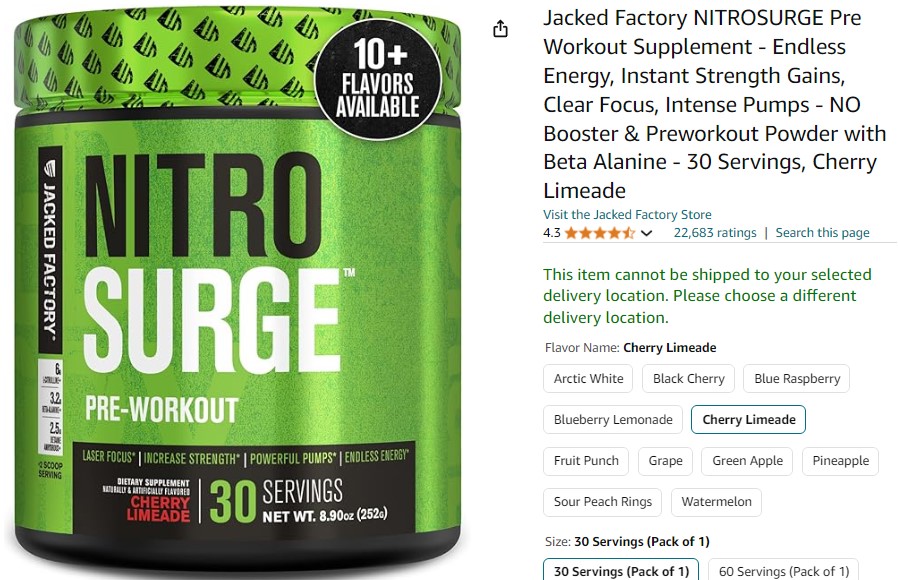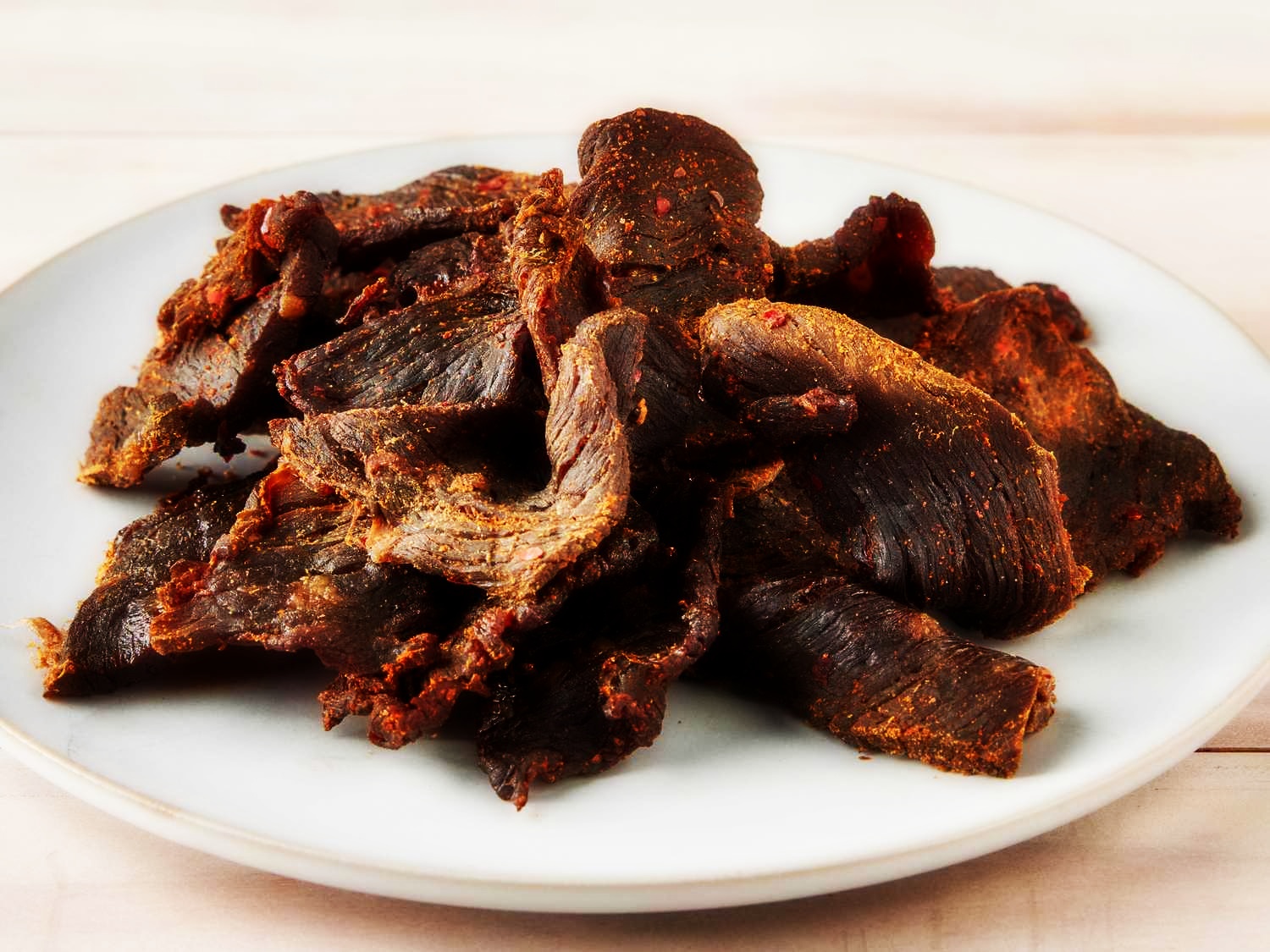Hey there, health-conscious snacker! If you’ve been eyeing that pack of jerky and wondering if it could be your new weight loss buddy, you’ve come to the right place.
Let’s chew over the facts and figure out if jerky can indeed be a part of your weight loss journey.
What’s the Beef with Jerky?
First things first, what exactly is jerky? Simply put, it’s meat that’s been trimmed of fat, cut into strips, and dried (dehydrated) to prevent spoilage.
Beef jerky is the most common, but you can find jerky made from turkey, chicken, pork, and even fish or game meats.
The Good News: Protein Power
One of the biggest pros of jerky for weight loss is its high protein content. Here’s why that matters:
- Keeps you feeling full: Protein is known for its ability to keep you satiated, which can help prevent overeating.
- Boosts metabolism: Your body burns more calories digesting protein compared to fats or carbs.
- Preserves muscle mass: When losing weight, you want to lose fat, not muscle. Protein helps maintain your muscle mass.
Did you know, 58.9% of consumers reported that these supplements block up to 30% of dietary fat. Besides, 9,000+ positive Amazon reviews, confirm these as well.

Click here to browse Top Rated Weight Loss Supplements.
Delicious Jerky Weight Loss Recipes
Jerky can be a high-protein, low-fat snack ideal for weight loss. Below are two recipes: one using lean beef and another using turkey breast. Both recipes are designed to be flavorful while keeping calories in check.
1. Spicy Lemon-Garlic Beef Jerky
Ingredients:
- 1 pound (450g) lean beef (top round or eye of round)
- 2 cloves garlic, minced
- 1 tablespoon fresh lemon juice
- 1 tablespoon soy sauce (low sodium)
- 1 tablespoon Worcestershire sauce
- 1 teaspoon ground black pepper
- 1 teaspoon smoked paprika
- 1 teaspoon crushed red pepper flakes (adjust for desired spice level)
- 1/2 teaspoon onion powder
- 1/2 teaspoon ground cumin
- 1/4 teaspoon salt
- 1 tablespoon honey (optional for slight sweetness)
Instructions:
- Prepare the Beef: Place the beef in the freezer for about 1-2 hours until it firms up slightly. This will make it easier to slice. Once firm, slice the beef against the grain into 1/8 to 1/4 inch thick strips.
- Marinate the Beef: In a bowl, mix the minced garlic, lemon juice, soy sauce, Worcestershire sauce, black pepper, smoked paprika, crushed red pepper flakes, onion powder, cumin, salt, and honey (if using). Add the beef strips to the marinade, ensuring they are well-coated. Cover and refrigerate for at least 4 hours, preferably overnight.
- Dry the Beef: Preheat your oven to 175°F (80°C). If using a dehydrator, follow the manufacturer’s instructions. Line a baking sheet with aluminum foil and place a wire rack on top. Lay the marinated beef strips on the rack in a single layer, making sure they don’t touch each other.
- Cook the Beef: Place the rack in the preheated oven. Keep the oven door slightly open to allow moisture to escape. Dry the beef for 3-6 hours, checking every hour after the 3-hour mark. The jerky is ready when it’s dry and firm, but still slightly pliable.
- Cool and Store: Remove the jerky from the oven and let it cool completely. Store it in an airtight container at room temperature for up to 2 weeks or in the refrigerator for longer freshness.
Nutritional Information (Per 1 oz. serving):
- Calories: ~70
- Protein: 11g
- Fat: 2g
- Carbohydrates: 1g
2. Savory Herb Turkey Jerky
Ingredients:
- 1 pound (450g) turkey breast (skinless)
- 2 tablespoons low-sodium soy sauce
- 1 tablespoon apple cider vinegar
- 1 tablespoon olive oil
- 1 tablespoon fresh rosemary, chopped
- 1 tablespoon fresh thyme, chopped
- 1 teaspoon garlic powder
- 1 teaspoon onion powder
- 1/2 teaspoon smoked paprika
- 1/2 teaspoon ground black pepper
- 1/4 teaspoon salt
- 1/2 teaspoon liquid smoke (optional for a smoky flavor)
Instructions:
- Prepare the Turkey: Place the turkey breast in the freezer for about 1-2 hours to firm it up. Once firm, slice the turkey into thin strips, about 1/8 to 1/4 inch thick.
- Marinate the Turkey: In a bowl, mix the soy sauce, apple cider vinegar, olive oil, rosemary, thyme, garlic powder, onion powder, smoked paprika, black pepper, salt, and liquid smoke (if using). Add the turkey strips to the marinade, ensuring they are evenly coated. Cover and refrigerate for at least 4 hours, or preferably overnight.
- Dry the Turkey: Preheat your oven to 175°F (80°C). If using a dehydrator, follow the manufacturer’s instructions. Line a baking sheet with parchment paper and place a wire rack on top. Arrange the turkey strips on the rack in a single layer.
- Cook the Turkey: Place the rack in the oven and keep the door slightly ajar to allow moisture to escape. Dry the turkey for 2-5 hours, checking for doneness after 2 hours. The jerky is ready when it is dry, firm, and still slightly bendable.
- Cool and Store: Remove the jerky from the oven and let it cool completely. Store in an airtight container at room temperature for up to 2 weeks, or in the refrigerator for longer storage.
Nutritional Information (Per 1 oz. serving):
- Calories: ~60
- Protein: 12g
- Fat: 1g
- Carbohydrates: 0.5g
Both of these jerky recipes are high in protein and low in fat, making them perfect snacks for weight loss. They’re also versatile and can be adjusted to suit your taste preferences by modifying the spices and seasonings.
Low in Calories, High in Flavor
Another point in jerky’s favor is that it’s relatively low in calories compared to many other snacks.
A typical 1-ounce serving of beef jerky contains about 80-90 calories. Compare that to a bag of chips or a candy bar, and you’ll see why jerky could be a smart choice for weight watchers.
The Sodium Situation
Now, let’s address the elephant in the room – sodium. Jerky is often high in salt, which is used as a preservative. While this doesn’t directly impact weight loss, it’s something to keep in mind:
- High sodium intake can lead to water retention, which might show up on the scale.
- If you have high blood pressure or other health concerns, the salt content could be an issue.
Not All Jerky is Created Equal
Here’s where things get a bit tricky. The nutritional value of jerky can vary widely depending on the brand and type. Some things to watch out for:
- Added sugars: Some brands add sugar for flavor, which adds unnecessary calories.
- Artificial ingredients: Look for jerky with minimal, recognizable ingredients.
- Fat content: While most jerky is lean, some types (like certain pork jerky) can be higher in fat.
How to Make Jerky Work for Your Weight Loss Goals
If you’re sold on giving jerky a try, here are some tips to make it work for your weight loss plan:
- Portion control: Just because it’s protein-packed doesn’t mean you should go overboard. Stick to the recommended serving size.
- Read labels: Choose brands with lower sodium and no added sugars.
- Timing is everything: Jerky can be a great post-workout snack to help with muscle recovery.
- Balance is key: Don’t rely solely on jerky. Incorporate it into a balanced diet rich in fruits, vegetables, and whole grains.
DIY Jerky: A Healthier Alternative?
If you’re feeling adventurous, why not try making your own jerky? This way, you have full control over the ingredients. Plus, it can be a fun weekend project! Here are some benefits of homemade jerky:
- You choose the meat (lean cuts are best for weight loss).
- Control the sodium levels.
- Avoid added sugars and preservatives.
- Experiment with healthy, flavorful spices.
Based on our survey, 76.4% of people successfully lose weight by consuming this pre-workout. Besides, you shouldn’t ignore 22,000+ positive Amazon ratings.
Click here to place your order!

The Verdict: Can Jerky Help with Weight Loss?
So, is jerky good for weight loss? The short answer is: it can be! When chosen wisely and eaten in moderation, jerky can be a helpful addition to a weight loss diet.
Its high protein content, low calorie count, and satisfying flavor make it a smart snack choice for many people trying to shed pounds.
However, it’s not a magic weight loss bullet. Jerky should be part of a well-rounded, calorie-controlled diet combined with regular exercise.
And as with any dietary change, it’s always a good idea to chat with a healthcare professional or a registered dietitian, especially if you have any health concerns.
Remember, successful weight loss is about finding a sustainable, enjoyable way of eating that works for you. If jerky helps you stay on track and satisfies your snack cravings without derailing your goals, then it might just be your new weight loss ally. Happy (and healthy) snacking!
